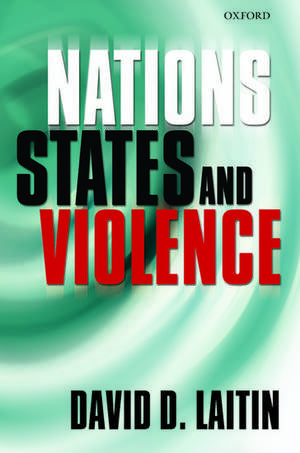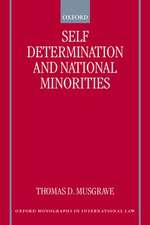Nations, States, and Violence
Autor David D. Laitinen Limba Engleză Hardback – 25 iul 2007
Preț: 416.06 lei
Preț vechi: 576.74 lei
-28% Nou
Puncte Express: 624
Preț estimativ în valută:
79.62€ • 82.82$ • 65.73£
79.62€ • 82.82$ • 65.73£
Carte tipărită la comandă
Livrare economică 04-10 aprilie
Preluare comenzi: 021 569.72.76
Specificații
ISBN-13: 9780199228232
ISBN-10: 019922823X
Pagini: 180
Ilustrații: 6 figures, 1 table
Dimensiuni: 142 x 211 x 19 mm
Greutate: 0.33 kg
Editura: OUP OXFORD
Colecția OUP Oxford
Locul publicării:Oxford, United Kingdom
ISBN-10: 019922823X
Pagini: 180
Ilustrații: 6 figures, 1 table
Dimensiuni: 142 x 211 x 19 mm
Greutate: 0.33 kg
Editura: OUP OXFORD
Colecția OUP Oxford
Locul publicării:Oxford, United Kingdom
Recenzii
The questions raised in the book are the right ones, and so seem to be most of the answers. Laitin's ambitious comparative take is accompanied by depth of analysis, turning the volume into a useful tool for policymakers as well as for the average student.
Notă biografică
David D. Laitin was born in Brooklyn, New York. He received his BA from Swarthmore College, and his Ph.D. at UC Berkeley, working under the direction of Ernst Haas and Hanna Pitkin. As a student of comparative politics, he has conducted field research in Somalia, Yorubaland, Catalonia and Estonia, working on issues of language and religion, and how these cultural phenomena link nation to state. His books include "Politics, Language and Thought: The Somali Experience", "Hegemony and Culture: Politics and Religious Change Among the Yoruba", and "Identity in Formation: The Russian-Speaking Populations in the Near Abroad". Most recently, in collaboration with James Fearon, he has published two papers in the "American Political Science Review" on ethnicity, ethnic cooperation, and the sources of civil war.














